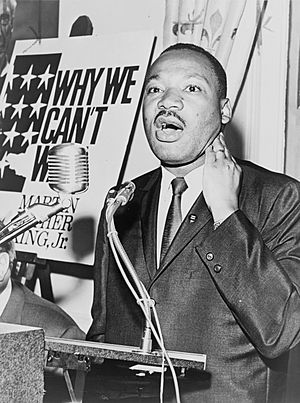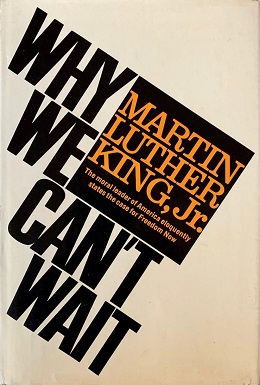Why We Can't Wait facts for kids
Why We Can't Wait is an important book written in 1964 by Martin Luther King Jr.. It's all about the peaceful fight against racial segregation in the United States. This means when people were kept separate because of their race. The book especially focuses on the 1963 Birmingham campaign, a major event in the Civil Rights Movement. King saw 1963 as a turning point, calling it the start of America's "Negro Revolution."
Contents
How the Book Was Written
The idea for Why We Can't Wait came from King's famous "Letter from Birmingham Jail." This letter became very well-known across the country. Publishers in New York were interested in it. Stanley Levison, a friend of King's, helped him make a deal with a publisher named Victor Weybright in May 1963. Weybright suggested the title Why We Can't Wait. He also allowed the "Letter from Birmingham Jail" to be printed in newspapers and magazines. It appeared in July 1963 with the title "Why the Negro Won't Wait."
King started writing the book later in 1963. He got help from Levison and Clarence Jones. Other people like Al Duckett, Nat Lamar, and Bayard Rustin also helped with the text. An editor named Hermine I. Popper also worked on it.
Bayard Rustin explained his role: "I want to be a real ghost and write what the person wants to say. I would never write anything that wasn't what he wanted to say. I understood him well enough."
The book includes most of the "Letter from Birmingham Jail." King mentioned that he polished the letter a bit for the book. Why We Can't Wait was published in July 1964.
Understanding the "Negro Revolution"
The book explains that 1963 was the start of the "Negro revolution." King wanted to show the historical events that led to this big change. He also wanted to explain why this revolution was nonviolent, meaning it used peaceful methods. He wrote about how quickly these changes became clear to everyone in America. He also stressed how important they would be for the future.
King wrote:
Just as lightning makes no sound until it strikes, the Negro Revolution generated quietly. But when it struck, the revealing flash of its power and the impact of its sincerity and fervor displayed a force of a frightening intensity. Three hundred years of humiliation, abuse, and deprivation cannot be expected to find voice in a whisper. [...]
Because there is more to come; because American society is bewildered by the spectacle of the Negro in revolt; because the dimensions are vast and the implications deep in a nation with twenty million Negroes, it is important to understand the history that is being made today.
Why 1963 Was a Key Year
King gave several reasons why the "Negro Revolution" exploded in 1963:
- Slow Progress: People were disappointed that schools were not desegregating quickly enough after the 1954 Brown v. Board ruling. This ruling said separate schools were illegal.
- Lack of Trust: Many felt politicians and the government weren't doing enough. They saw the Kennedy administration as weak on housing discrimination and not supporting Black voting rights in the South.
- Global Awareness: Countries in Africa and Asia were gaining independence. This made the world see how Black Americans were still being treated unfairly.
- Emancipation Centennial: 1963 was 100 years after the 1863 Emancipation Proclamation. This reminded Black people that even though they were legally free, they still faced oppression.
- Economic Hardship: The Great Depression never truly ended for African Americans. While others saw economic recovery, Black unemployment went up. King said that economic inequality was very clear in 1963.
- Rise of Nonviolent Action: Peaceful methods of protest, called nonviolent direct action, became a powerful way to demand change.
The Power of Peaceful Resistance
King explained why nonviolent resistance was so strong. One key idea was changing how jails worked. Jails were used to scare people. But when large groups of peaceful protesters filled the jails, it changed things. Being jailed became a political act, making jail less of a punishment.
King criticized "tokenism." This is when a small, symbolic effort is made to seem like progress, but it doesn't bring real change. He said tokenism offers false pride without real power. He wrote that it stops protest instead of starting true equality.
He also looked at other ways people tried to bring social change for Black Americans. These included the quiet approach of Booker T. Washington, the focus on a few talented leaders by W. E. B. Du Bois, the idea of Pan-Africanism from Marcus Garvey, and legal battles by the National Association for the Advancement of Colored People (NAACP). King argued that none of these approaches promised real, widespread change for all Black Americans.
The Birmingham Campaign
King described Birmingham, Alabama, under Commissioner "Bull" Connor. He called it an old-fashioned city where Black people lacked basic human rights. They lived under violence and fear.
He wrote about the early protests by the Alabama Christian Movement for Human Rights (ACHR). Then he described how Bull Connor tried to scare the SCLC. Despite this, the SCLC planned the Birmingham campaign. They believed that if segregation could be defeated in Birmingham, it would help the whole United States.
King talked about the partnership between the SCLC and the ACHR. He showed a "Commitment Card" that volunteers signed. On this card, people promised to think about Jesus's life, pray daily, care for their community, and seek "justice and reconciliation—not victory." He shared his own story of being jailed during the protests. Then he included his famous "Letter from Birmingham Jail."
As the protests continued, the city government became more willing to talk. King described how many young people joined the demonstrations. Jails became full, and powerful photographs brought international media attention. On May 10, 1963, negotiators reached an agreement. The city promised to end segregation within 90 days. They also agreed to jobs for Black people in local businesses, releasing those jailed during the campaign, and ongoing talks between Black and White leaders.
After the agreement, there was an attempt to assassinate King by the local Ku Klux Klan. A bombing at King's hotel room caused unrest in Birmingham. This brought in police and the National Guard.
Thousands of student protesters were expelled from school by the Birmingham Board of Education. The NAACP challenged this decision. A judge named Elbert P. Tuttle in the Fifth Circuit Court of Appeals overturned the expulsion.
The Ongoing Revolution
King urged continued action, comparing the Birmingham campaign to the Battle of Bunker Hill. This was a key battle that started the American Revolutionary War. He warned against becoming too comfortable after Birmingham. He suggested that revolt is just the beginning of a revolution.
He called for unity among all races. He pointed out that Black people were not the only group treated unfairly in America. He wrote: "Our nation was born in genocide when it embraced the doctrine that the original American, the Indian, was an inferior race." He believed that by the summer of 1963, most White Americans were more open to the idea of legal equality for Black people.
He described the August 1963 March on Washington for Jobs and Freedom. He praised White churches for joining but was frustrated by the neutrality of the AFL–CIO, a large group of labor unions. He noted that millions watched the March on television and hoped for the future of this medium.
The book ends by explaining "why we can't wait." King said Black people must no longer just move towards freedom but must claim their freedom now. He wrote: "It is because the Negro knows that no person—as well as no nation—can truly exist half slave and half free that he has embroiders upon his banners the significant word now." He called for a Bill of Rights for the Disadvantaged. This would include reparations for unpaid wages. He hoped for a partnership with poor White people and organized labor. He suggested the Civil Rights Movement could work with President Lyndon Johnson. He warned that political work is risky but needed. He ended by saying that if the Civil Rights Revolution succeeds, it could spread nonviolence worldwide. This could end the nuclear arms race and bring world peace.
Legacy of the Book
Why We Can't Wait has inspired many.
- In September 2011, Adbusters mentioned the book as an inspiration for the Occupy Wall Street movement. This movement protested economic inequality.
- In October 2011, the Obama administration used the slogan "We Can't Wait." This was part of their plan to make policy changes even with a difficult Congress.
The book has received much praise. It was ranked #78 on Modern Library's list of the 100 best non-fiction books written in English.
 | Janet Taylor Pickett |
 | Synthia Saint James |
 | Howardena Pindell |
 | Faith Ringgold |



